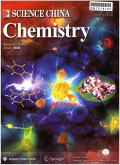- 钛学术文献服务平台 \
- 学术期刊 \
- 基础科学期刊 \
- 自然科学总论期刊 \
- 中国科学:化学(英文版)期刊 \
Advances and prospective in thermally stable nonfullerene polymer solar cells
Advances and prospective in thermally stable nonfullerene polymer solar cells
基本信息来源于合作网站,原文需代理用户跳转至来源网站获取
摘要:
Polymer solar cells (PSCs) featuring nonfullerene acceptors have attracted a great deal of attention in the research community.Exposure of these active layers to sunlight during operation demands excellent thermal stability.Optimizing PSCs often requires a step of thermal annealing,while long-term annealing often places a constraint on their stable operation at elevated temperature and results in a progressive loss of photovoltaic performance.Hence,it is crucial to understand and control the fundamental affecting factors on the thermal stability of nonfullerene PSCs.This review highlights the relationships between microstructure and thermal stability of PSCs and summarizes promising strategies to push this technology toward the level of practical application.Finally,we present the current challenges and prospective of this research area,intending to advance the practical applications of stable PSCs based on nonfullerene acceptors.

推荐文章
Snowball Earth at low solar luminosity prevented by the ocean–atmosphere coupling
Faint Young Sun paradox
Carbon dioxide
Earth system
Siderite
Statistics matters in interpretations of non-traditional stable isotopic data
Isotopic data processing
Error propagation
Significant digits
Difference between means with uncertainties
Alpha-stable粗糙面与下方目标的复合电磁散射研究
电磁散射
矩量法
空间域合成法
Alpha-stable分布
三角形截面柱
杂质SO42-对Solar Salt熔盐热物性的影响及分析
Solar Salt熔盐
热物性
杂质离子
混合熔盐
内容分析
关键词云
关键词热度
相关文献总数
(/次)
(/年)
文献信息
| 篇名 | Advances and prospective in thermally stable nonfullerene polymer solar cells | ||
| 来源期刊 | 中国科学:化学(英文版) | 学科 | |
| 关键词 | |||
| 年,卷(期) | 2021,(11) | 所属期刊栏目 | REVIEWS |
| 研究方向 | 页码范围 | 1875-1887 | |
| 页数 | 13页 | 分类号 | |
| 字数 | 语种 | 英文 | |
| DOI | |||
五维指标
引文网络
引文网络
二级参考文献 (0)
共引文献 (0)
参考文献 (0)
节点文献
引证文献 (0)
同被引文献 (0)
二级引证文献 (0)
2021(0)
- 参考文献(0)
- 二级参考文献(0)
- 引证文献(0)
- 二级引证文献(0)
引文网络交叉学科
相关学者/机构
期刊影响力
中国科学:化学(英文版)
主办单位:
中国科学院
出版周期:
月刊
ISSN:
1674-7291
CN:
11-5839/O6
开本:
16开
出版地:
北京东黄城根北街16号
邮发代号:
创刊时间:
1950
语种:
eng
出版文献量(篇)
4060
总下载数(次)
0
总被引数(次)
11421
期刊文献
相关文献
推荐文献
- 期刊分类
- 期刊(年)
- 期刊(期)
- 期刊推荐
力学
化学
地球物理学
地质学
基础科学综合
大学学报
天文学
天文学、地球科学
数学
气象学
海洋学
物理学
生物学
生物科学
自然地理学和测绘学
自然科学总论
自然科学理论与方法
资源科学
非线性科学与系统科学
中国科学:化学(英文版)2022
中国科学:化学(英文版)2021
中国科学:化学(英文版)2020
中国科学:化学(英文版)2019
中国科学:化学(英文版)2018
中国科学:化学(英文版)2017
中国科学:化学(英文版)2016
中国科学:化学(英文版)2015
中国科学:化学(英文版)2014
中国科学:化学(英文版)2013
中国科学:化学(英文版)2012
中国科学:化学(英文版)2011
中国科学:化学(英文版)2010
中国科学:化学(英文版)2009
中国科学:化学(英文版)2008
中国科学:化学(英文版)2007
中国科学:化学(英文版)2006
中国科学:化学(英文版)2005
中国科学:化学(英文版)2004
中国科学:化学(英文版)2003
中国科学:化学(英文版)2002
中国科学:化学(英文版)2001
中国科学:化学(英文版)2000
中国科学:化学(英文版)2021年第7期
中国科学:化学(英文版)2021年第6期
中国科学:化学(英文版)2021年第5期
中国科学:化学(英文版)2021年第4期
中国科学:化学(英文版)2021年第3期
中国科学:化学(英文版)2021年第2期
中国科学:化学(英文版)2021年第12期
中国科学:化学(英文版)2021年第11期
中国科学:化学(英文版)2021年第1期

 免费查重
免费查重










